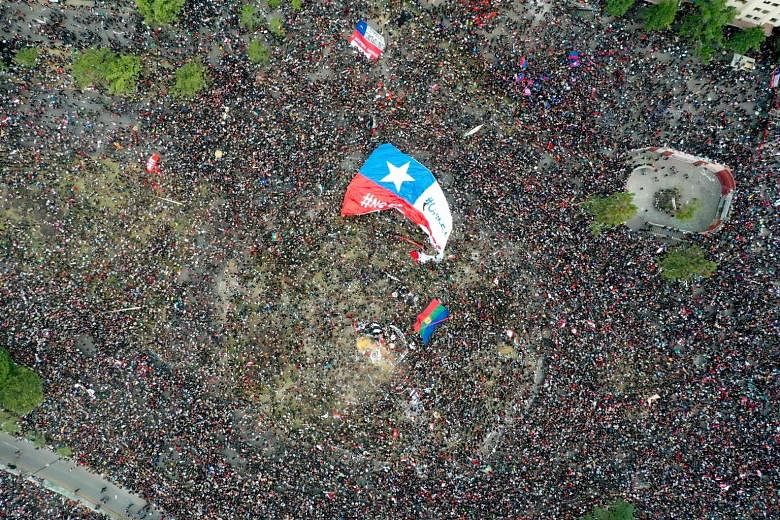SANTIAGO • More than a million people poured into Santiago's public squares and thoroughfares in one of the biggest street protests ever seen in the Chilean capital.
Downtown areas such as the iconic Plaza Italia came alive on Friday afternoon with people, mainly students and 20-somethings but also older people and families, waving flags and banners seeking better pay, pensions, healthcare and education.
Many who participated in neighbourhood protests earlier in the week joined the downtown demonstrations on Friday, which were organised on social media via the hashtag #LaMarchaMasGrandeDeChile (Chile's biggest march).
"We need a new social pact, a new constitution made by all of us," said Mr Pablo Steil, who owns a marketing business with 30 employees. "I'm one of Chile's privileged and we need to start thinking we'll have to give something more to make this society a bit fairer."
Earlier in the day, truckers and bus drivers jammed roads and highways around Santiago, pushing for the elimination of user-pay fees on urban highways. The congressional building in Valparaiso was evacuated after a group of protesters tried to force their way in.
While violence appears to be abating, the largely peaceful street turnouts have gained momentum. A survey by pollster Activa Research showed 84 per cent of Chileans support the demonstrations and 37 per cent said the government has been slow to respond.
President Sebastian Pinera plans to hold talks with business groups, unions, universities, mayors and part of his Cabinet over the weekend. The breadth of the protests points to the huge challenge facing his centre-right government.
He initially tackled the unrest as a law-and-order matter, an approach that only made matters worse. He then apologised for failing to recognise genuine grievances and announced measures including raising taxes for high-income earners and lifting pensions. Protesters want more sweeping changes, an immediate withdrawal of troops and Cabinet changes.
"The government has so far proposed band-aid solutions," said Ms Gloria Gomez, a notary employee in the low-income district of Renca. "I'll keep demonstrating for as long as protests remain peaceful."
Elsewhere in the country, many Chileans were trying to return to normal. Copper miners and port workers ended protests and resumed operations while more subway stations, shops and schools reopened. Still, there are more reports of sporadic looting.
Earlier, television images showed the full extent of damage from subway riots that triggered the protests. While the official death toll rose to 19, the National Human Rights Institute said 585 people had been wounded and 2,948 had been arrested as of noon on Friday. It has filed 12 lawsuits against the authorities for sexual violence including stripping detainees, groping and threats of rape.
While more than 600 supermarkets have been looted, the rate of serious violent events has slowed. Losses for Chile's retail sector due to looting and lost sales have reached US$1.4 billion (S$1.9 billion) since the protests began, said the Santiago Chamber of Commerce.
Chile's benchmark stock index capped its worst week in almost two years, with losses paced by utilities and consumer shares. The Chilean peso sank 2.2 per cent against the US dollar last week.
Former Chilean president Michelle Bachelet, now the UN High Commissioner for Human Rights, said she would send a team to look into allegations of human-rights violations, a move the government welcomed.
BLOOMBERG

